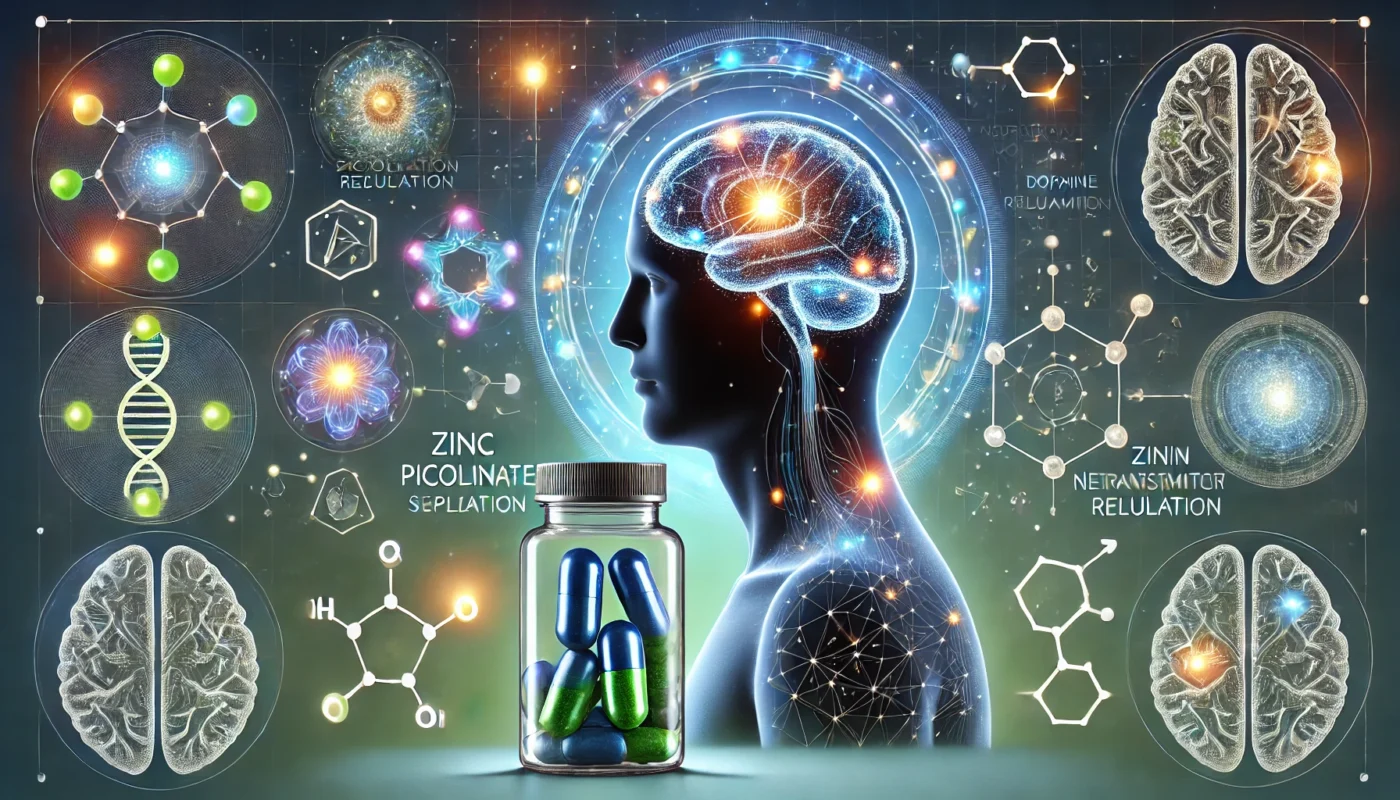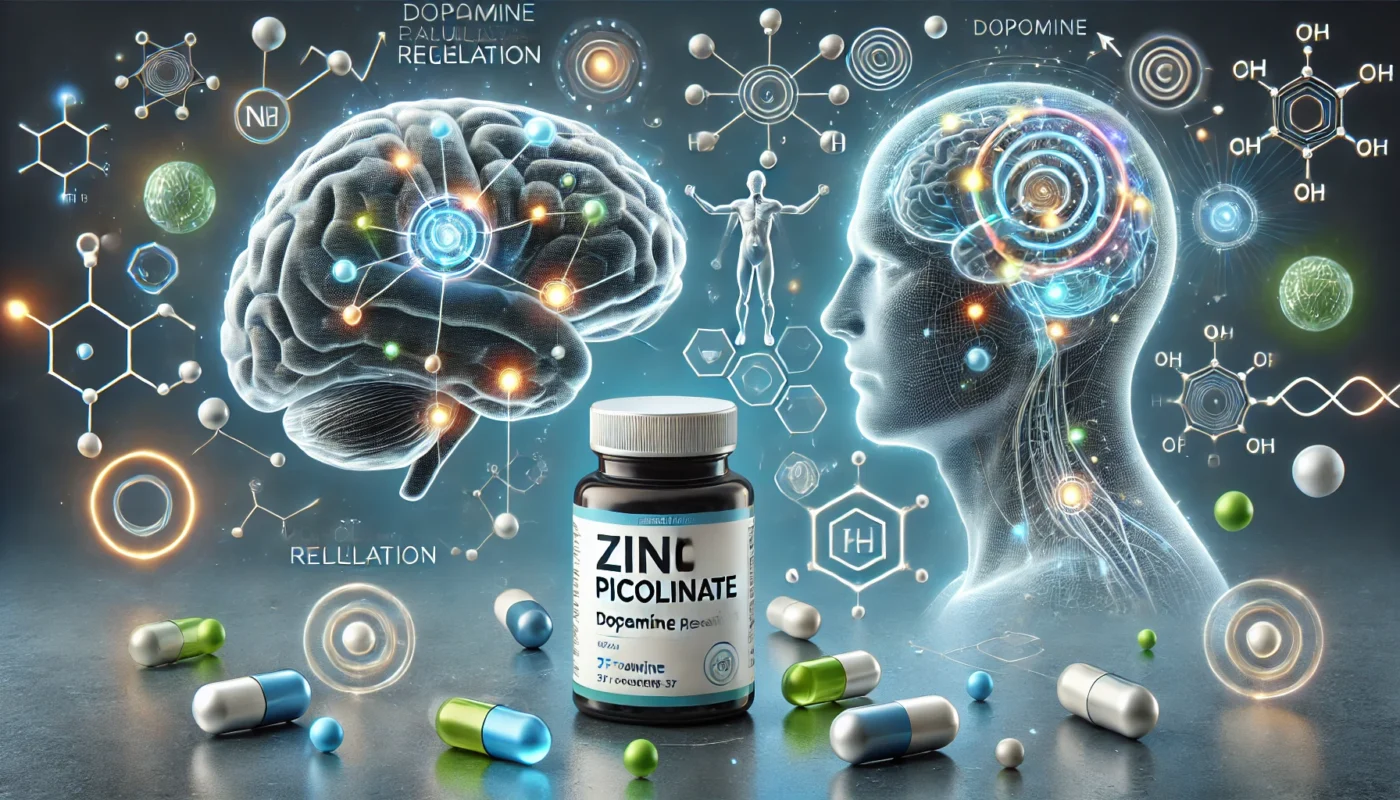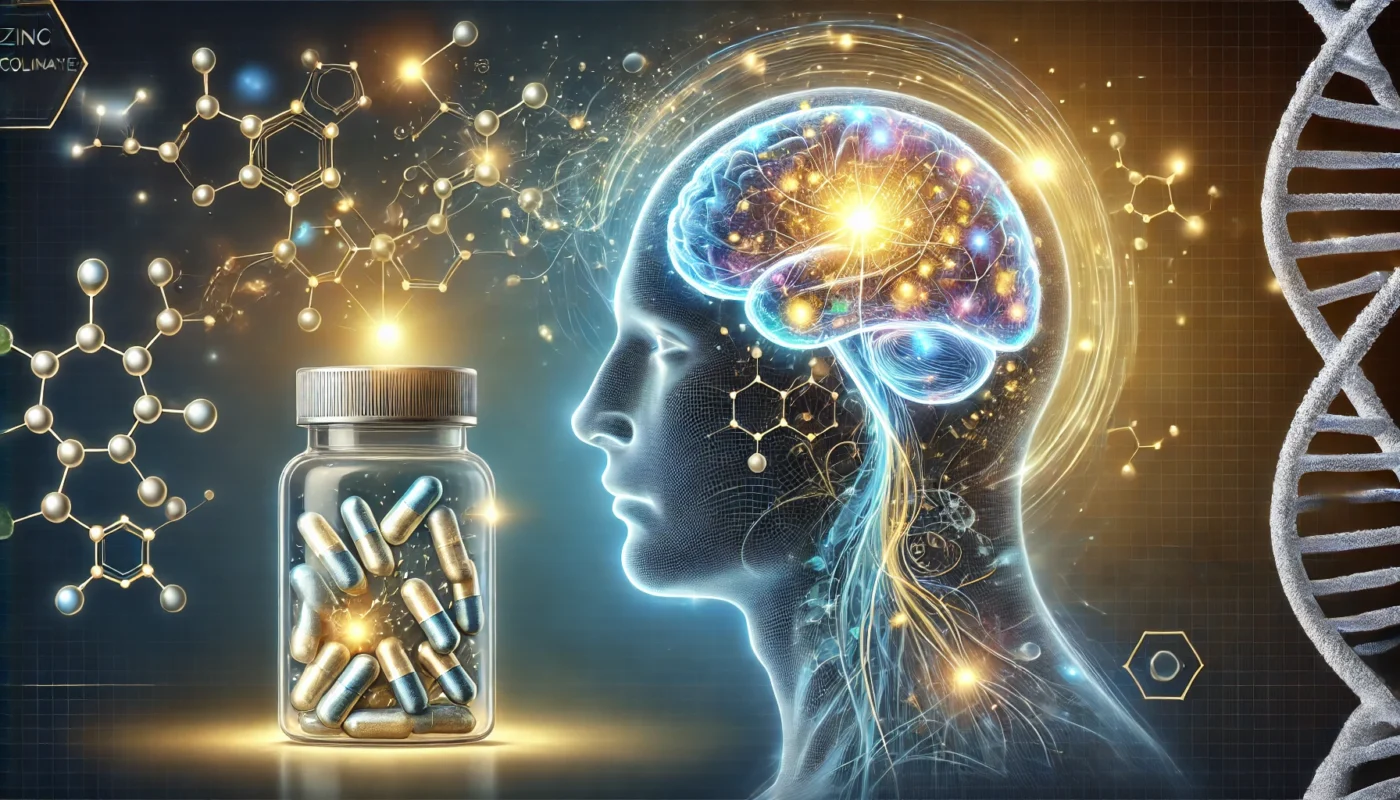Dopamine is one of the brain’s most important neurotransmitters, playing a critical role in mood regulation, motivation, focus, and reward-driven behaviors. Imbalances in dopamine levels have been linked to conditions such as depression, attention-deficit/hyperactivity disorder (ADHD), and Parkinson’s disease. While lifestyle factors and genetics contribute to dopamine regulation, nutrition also plays a crucial role in maintaining optimal levels of this key neurotransmitter.
Zinc, an essential trace mineral, is gaining attention for its role in supporting neurotransmitter health. Zinc picolinate, a highly bioavailable form of zinc, is particularly effective in enhancing dopamine regulation and promoting overall mental well-being. This article explores the scientific connection between zinc picolinate and dopamine, highlighting its potential to improve mood, focus, and cognitive function.
You May Also Like:
Zinc Picolinate and Infant Brain Development: What Science Reveals
How Zinc Picolinate Protects Against Neurotoxins: Safeguarding the Brain
The Connection Between Zinc Picolinate and Dopamine Regulation: What Science Says is an original (HSLHealing) article.
Understanding Dopamine and Its Importance
Dopamine is a chemical messenger in the brain that affects several aspects of mental and physical health. It is produced in areas of the brain like the substantia nigra and ventral tegmental area and is involved in various processes:
- Mood Regulation:
Dopamine influences feelings of pleasure, happiness, and emotional stability. - Motivation and Reward:
It drives goal-directed behaviors and reinforces rewarding experiences. - Cognitive Function:
Dopamine plays a role in focus, memory, and problem-solving abilities. - Motor Control:
Dopamine is essential for coordinating voluntary movements.
The Role of Zinc in Dopamine Regulation
Zinc is involved in several pathways that affect dopamine production, release, and function. Key mechanisms include:
- Dopamine Synthesis:
Zinc is a cofactor for enzymes that convert the amino acid tyrosine into dopamine. - Dopamine Storage and Release:
Zinc regulates vesicular storage of dopamine, ensuring its availability for neurotransmission. - Protecting Dopamine Neurons:
Zinc’s antioxidant properties protect dopamine-producing neurons from oxidative damage. - Balancing Dopamine Receptors:
Zinc modulates the activity of dopamine receptors, ensuring appropriate signaling and preventing overactivation or inhibition.

What Is Zinc Picolinate?
Zinc picolinate is a chelated form of zinc, where zinc is bound to picolinic acid. This form enhances absorption in the gastrointestinal tract, making it one of the most bioavailable and effective forms of zinc supplementation. For individuals seeking to support dopamine regulation and mental health, zinc picolinate ensures efficient delivery of zinc to the brain.
How Zinc Picolinate Supports Dopamine Regulation
1. Enhancing Dopamine Synthesis
Dopamine synthesis begins with the conversion of the amino acid tyrosine into L-DOPA, a precursor to dopamine. Zinc serves as a cofactor for the enzyme tyrosine hydroxylase, which catalyzes this reaction. Zinc picolinate ensures adequate zinc levels to support this enzymatic process.
- Study Insight: Research in Journal of Neuroscience Research found that zinc deficiency reduced tyrosine hydroxylase activity by 30%, leading to lower dopamine levels.
2. Protecting Dopaminergic Neurons
Oxidative stress can damage dopamine-producing neurons, particularly in conditions like Parkinson’s disease. Zinc picolinate’s antioxidant properties neutralize free radicals, protecting these neurons from oxidative damage.
- Clinical Evidence: A study in Free Radical Biology and Medicine demonstrated that zinc supplementation reduced oxidative stress markers by 25%, preserving dopamine-producing neurons in animal models.
3. Regulating Dopamine Receptors
Dopamine receptors (D1-D5) are responsible for transmitting dopamine signals across neurons. Zinc modulates the activity of these receptors, preventing overstimulation that can lead to anxiety or under activation linked to depression.
- Research Finding: A study in Biological Psychiatry reported that zinc supplementation normalized dopamine receptor activity in individuals with depressive symptoms.
4. Supporting Synaptic Plasticity
Synaptic plasticity, the brain’s ability to adapt and form new connections, is crucial for learning and memory. Zinc picolinate enhances synaptic plasticity by regulating dopamine signaling pathways.
- Evidence: Research in Frontiers in Neuroscience showed that zinc supplementation improved synaptic plasticity and cognitive performance in animal models of dopamine dysregulation.
5. Improving Mood and Reducing Depression
Low dopamine levels are associated with depressive symptoms, including fatigue, lack of motivation, and anhedonia (inability to feel pleasure). Zinc picolinate supports dopamine production and receptor balance, alleviating these symptoms.
- Clinical Trial: A study in Journal of Affective Disorders found that zinc supplementation reduced depressive symptoms by 30% in individuals with treatment-resistant depression, highlighting its role in dopamine regulation.

Zinc Deficiency and Dopamine Imbalance
Zinc deficiency can impair dopamine synthesis and receptor function, leading to symptoms such as mood instability, cognitive decline, and fatigue. Common causes of zinc deficiency include poor dietary intake, chronic stress, and certain medical conditions.
Symptoms of Zinc Deficiency Include:
- Depression or low mood
- Difficulty concentrating
- Fatigue and lack of motivation
- Poor memory and cognitive performance
Statistics:
- A study in The Lancet reported that 20% of the global population is at risk of zinc deficiency, with higher rates in individuals consuming low-protein or plant-based diets.
Dietary Sources of Zinc
In addition to supplementation, zinc can be obtained from dietary sources. Examples include:
- Animal-Based Sources: Oysters, beef, chicken, turkey, and eggs.
- Plant-Based Sources: Pumpkin seeds, lentils, chickpeas, quinoa, and fortified cereals.
For individuals with dietary restrictions or increased zinc needs, zinc picolinate offers a reliable and bioavailable alternative.
Recommended Dosage and Safety
The recommended dietary allowance (RDA) for zinc is:
- Men: 11 mg/day
- Women: 8 mg/day
For supporting dopamine regulation and mental health, therapeutic doses of zinc picolinate typically range from 15–30 mg/day. Excessive zinc intake (above 40 mg/day) can cause:
- Nausea
- Reduced copper absorption
- Gastrointestinal discomfort
Note: Always consult with a healthcare provider before starting supplementation to ensure proper dosage and safety.

Integrating Zinc Picolinate into a Mental Health Routine
- Take with Meals: Zinc picolinate is best absorbed when taken with food, particularly meals containing protein.
- Combine with Tyrosine-Rich Foods: Foods like eggs, fish, and nuts provide the amino acid tyrosine, a precursor to dopamine.
- Pair with Antioxidants: Antioxidants like vitamin C and vitamin E complement zinc’s neuroprotective effects.
- Monitor Mood and Focus: Track improvements in energy levels, concentration, and overall mood after starting supplementation.
Who Can Benefit from Zinc Picolinate for Dopamine Regulation?
- Individuals with Depression: Zinc picolinate enhances dopamine production, improving mood and motivation.
- People with ADHD: Zinc supports dopamine signaling, which is often impaired in ADHD.
- Those Experiencing Cognitive Decline: Zinc helps maintain synaptic plasticity and cognitive function.
- Athletes or Busy Professionals: Zinc supports mental clarity and focus during high-stress periods.
Future Research Directions
While current evidence supports zinc picolinate’s role in dopamine regulation, further studies could explore:
- Its long-term effects on mental health and cognitive performance.
- Synergistic benefits with other nutrients, such as magnesium and omega-3 fatty acids.
- Zinc’s role in preventing neurodegenerative diseases like Parkinson’s.
Conclusion: Zinc Picolinate for Dopamine and Mood Regulation
Zinc picolinate offers a promising, science-backed solution for supporting dopamine regulation and enhancing mood. By promoting dopamine synthesis, protecting dopaminergic neurons, and modulating receptor activity, it addresses key factors in mental health and cognitive function.
For individuals seeking to improve mood, focus, and overall well-being, incorporating zinc picolinate into their daily routine provides significant benefits. As always, consult with a healthcare provider to tailor supplementation to your specific needs and ensure safe and effective use.

References
- Discovery of Zinc for Human Health and Biomarkers of Zinc Deficiency. Retrieved from: https://pmc.ncbi.nlm.nih.gov/articles/PMC7149581/
- Effect of Zinc supplementation on child development: a systematic review and Dopamine Regulation. Retrieved from: https://pmc.ncbi.nlm.nih.gov/articles/PMC7856432/
- Neuroprotective effects of zinc on antioxidant defense system in lithium treated rat brain. Retrieved from: https://pubmed.ncbi.nlm.nih.gov/18072539/
- The Important Role of Zinc in Neurological Diseases. Retrieved from: https://pmc.ncbi.nlm.nih.gov/articles/PMC9855948/
- Discovery of Human Zinc Deficiency: Its Impact on Human Health and Dopamine Regulation. Retrieved from: https://pmc.ncbi.nlm.nih.gov/articles/PMC3649098/
- Zinc supplementation sustained normative neurodevelopment in a randomized, controlled trial of Peruvian infants aged 6-18 months. Retrieved from: https://pubmed.ncbi.nlm.nih.gov/24850625/
Important Note: The information contained in this article is for general informational purposes only, and should not be construed as health or medical advice, nor is it intended to diagnose, prevent, treat, or cure any disease or health condition. Before embarking on any diet, fitness regimen, or program of nutritional supplementation, it is advisable to consult your healthcare professional in order to determine its safety and probable efficacy in terms of your individual state of health.
Regarding Nutritional Supplements Or Other Non-Prescription Health Products: If any nutritional supplements or other non-prescription health products are mentioned in the foregoing article, any claims or statements made about them have not been evaluated by the U.S. Food and Drug Administration, and such nutritional supplements or other health products are not intended to diagnose, treat, cure, or prevent any disease.

